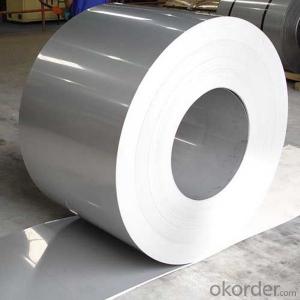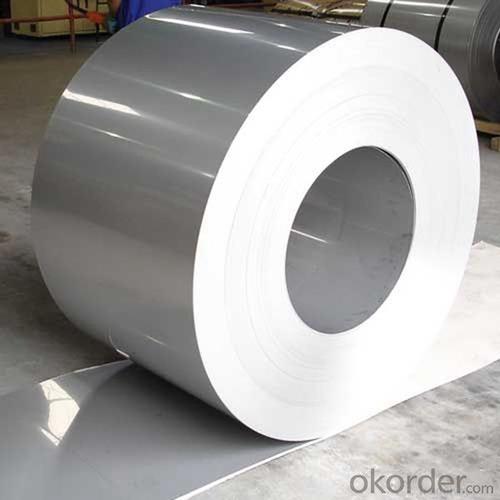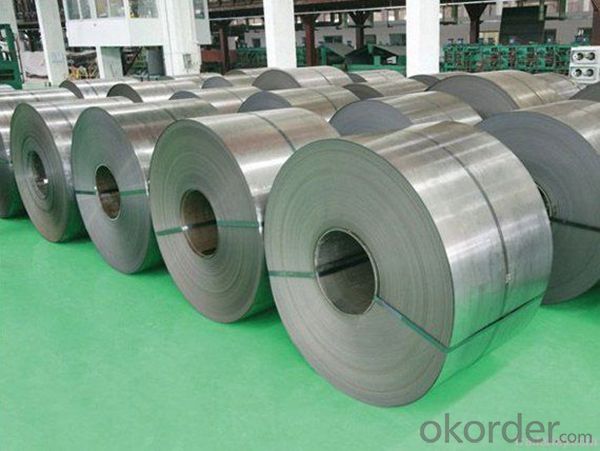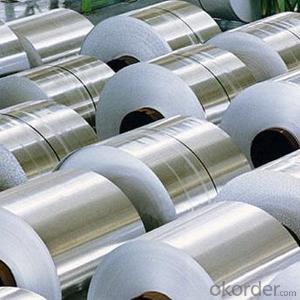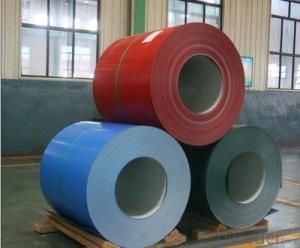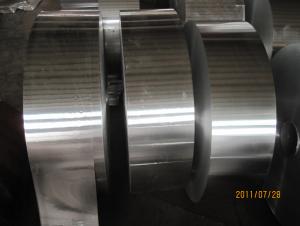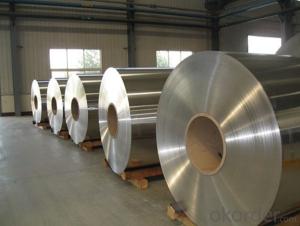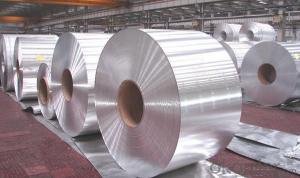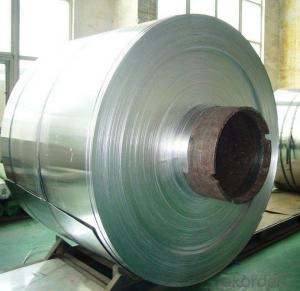Rona Aluminum Coil - Continuous Cast Aluminum Coil AA1200 H14 for Building
- Loading Port:
- Shanghai
- Payment Terms:
- TT OR LC
- Min Order Qty:
- 5 m.t.
- Supply Capability:
- 10000 m.t./month
OKorder Service Pledge
OKorder Financial Service
You Might Also Like
Specification
1. Specification of Continuous Cast Aluminium Coil AA1200 H14 for Building
Name | Aluminum Coil |
Brand | CNBM |
Alloy | 1100H-18, 3003-H24,3003-H26,3005-H26,8011,3004,3105,5005,etc. |
Thickness | 0.1~1.5mm |
Width | <2000mm< span=""> |
MOQ | 1 MT |
Coating finish | Brushed, drawing, embossed, printing |
Color | As to code RAL |
Surface | Embossed,Mill Finish,Coated,Brushed |
Gloss | 10-90%(EN ISO-2813:1994) |
Total coating thick | PVDF27 ~35micron |
Polyester18~27micron(EN ISO-2360:1995) | |
Coating hardness | 2H |
Adhesion | 5B (EN ISO-2409:1994) |
Impact resistance | No cracking and peeling (A.S.T.M D2794-1993) |
Flexibility (T-bend) | 0T- 2T |
MEK resistance | 100 |
Certification | ISO9001:2000, CE, SGS |
Coil's standard diameter | 1100mm |
Inner Diameter | 405mm/505mm |
Coil's standard weight | 1MT - 2MT |
2. Application of Continuous Cast Aluminium Coil AA1200 H14 for Building
(1).Interior: wall cladding, ceilings, bathrooms, kitchens and balconies, shutters, doors...
(2).Exterior: wall cladding, facades, roofing, canopies, tunnels,column covers , renovations...
(3).Advertisement: display platforms, signboards, fascia, shop fronts...
3. Feature of Continuous Cast Aluminium Coil AA1200 H14 for Building
*Such coil is specially designed to replace aluminum ingot, due to the high export tax of aluminum ingot, the coil has better price than ingot.
*This type of coil can fit customer's remelting furnace just like ingot, no need to make any change to the production line that was previously used for ingot. The standard coil size and weight is very suitable for the feed gate of furnace.
*This type of coil causes less material wastage than ingot when remelted.
*Our coil is made directly from ore, no need to go though the ingot making process, quality is much better than other suppliers who use ingot scrap to make coil.
Be free from Oil Stain, Dent, Inclusion, Scratches, Stain, Oxide Dicoloration, Breaks, Corrosion, Roll Marks, Dirt Streaks and other defect which will interfere with use
4. Certificate:
SGS and ROHS(if client request, paid by client), MTC(plant provided), Certificate of Origin(FORM A, FORM E, CO), Bureau Veritas and SGS (if client request, paid by client), CIQS certificate
5. Image of Continuous Cast Aluminium Coil AA1200 H14 for Building
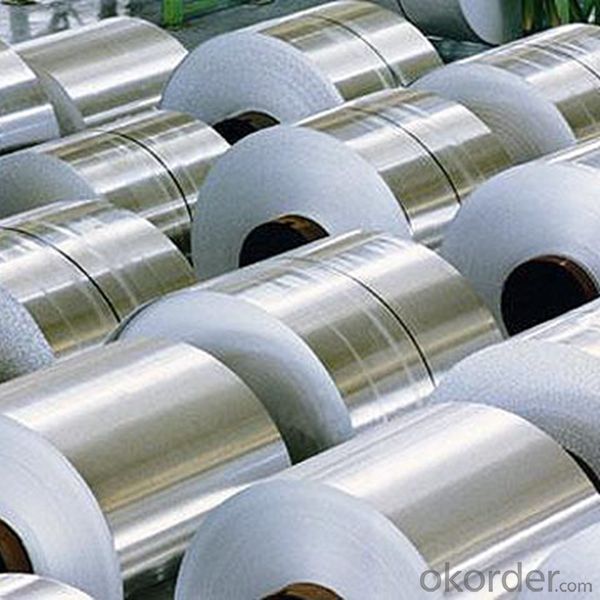
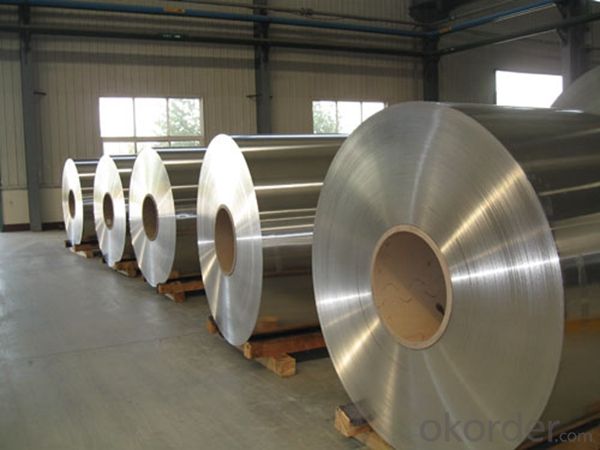
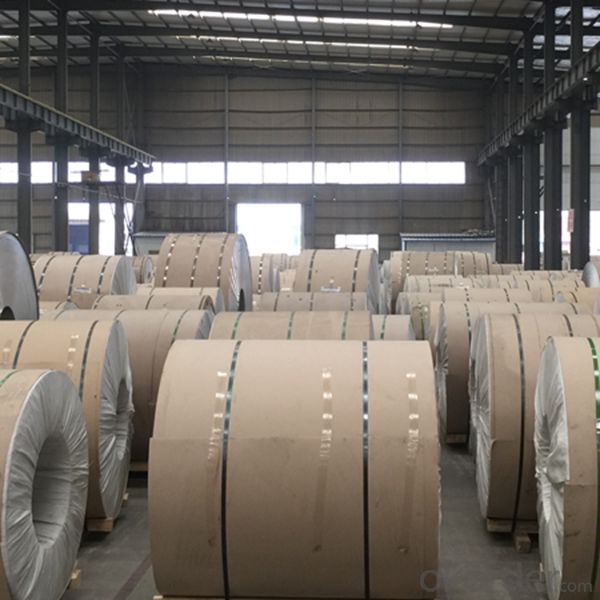
6. Package and shipping of Continuous Cast Aluminium Coil AA1200 H14 for Building
eye to wall
eye to the wall
with wood pallet (wooded case also available)
7. FAQ
1) What is the delivery time?
Dpends on actual order, around 20 to 35 days
2)What is the QC system:
We have QC staff of 20 persons and advanced equipment, each production is with MTC traced from Aluminum ingot lot.
3) What market do you mainly sell to?
Australia, America, Asia, Middle East, Western Europe, Africa etc
- Q: Is there any specific legislation or rules governing the use of aluminum coils in public areas?
- <p>There are no universal special regulations for using aluminum coils in public places. However, regulations can vary by country, state, or even city. In some cases, building codes or safety regulations might dictate the use of certain materials, including aluminum coils, in construction or other applications within public spaces. It's important to check local regulations and guidelines to ensure compliance when using aluminum coils in public areas.</p>
- Q: What specific conditions or precautions need to be taken into account when storing and transporting steel wires intended for coiling purposes?
- <p>Yes, there are special requirements for storing and transporting steel wires for coiling. These wires must be kept dry to prevent rust and should be stored in a cool, dry place away from direct sunlight or extreme temperatures. They should be handled carefully to avoid kinks or deformations. When transporting, it's important to secure the coils to prevent shifting during transit, which could cause damage. Additionally, the packaging should be robust enough to protect the wires from moisture and physical damage.</p>
- Q: This question asks for methods to determine the age of an aluminum coil, distinguishing between new and old.
- <p>To determine if an aluminum coil is new or old, you can look for several indicators: the surface condition, such as scratches or signs of wear; the quality of the protective coating, if any, which may degrade over time; the manufacturing date or batch number, if available; and the overall appearance and shine. New coils typically have a smooth, shiny surface with no significant scratches or dents, and a consistent protective coating. Old coils may show signs of oxidation, discoloration, or other forms of degradation. Additionally, testing the coil's physical properties, such as tensile strength, can provide clues about its age, as these properties can degrade over time.</p>
- Q: Can aluminum coils be used in the production of aluminum gutters?
- Yes, aluminum coils can be used in the production of aluminum gutters. Aluminum coils are commonly used in the manufacturing process of aluminum gutters. These coils are made from aluminum alloy, which is a lightweight and durable material. The coils are shaped and formed into the desired gutter profile using specialized machinery. The use of aluminum coils allows for efficient and precise production of gutters, ensuring a high-quality end product. Additionally, aluminum is corrosion-resistant, making it an ideal material for gutters, as it can withstand exposure to weather elements such as rain and snow. Overall, aluminum coils are a suitable choice for the production of aluminum gutters due to their strength, durability, and resistance to corrosion.
- Q: How are aluminum coils tested for flatness?
- Various methods are employed to test the flatness of aluminum coils, guaranteeing their compliance with the necessary standards. One commonly used approach involves the utilization of a straight edge. In this method, a lengthy and meticulously precise straight edge is placed on the coil's surface. Technicians then visually inspect for any discrepancies or gaps between the straight edge and the coil. The presence of such gaps indicates that the coil is not flat, necessitating further examination. Another technique utilized is the straight edge ruler method. Here, a ruler with a thin and flexible edge is applied to the surface of the coil. By applying gentle pressure, technicians can identify any areas where the ruler fails to fully make contact with the coil, indicating irregularities in its flatness. Advanced methods, including laser or optical techniques, are also employed to assess the flatness of aluminum coils. These methods employ laser beams or optical sensors to measure the surface profile of the coil. The collected data is then analyzed to determine if there are any deviations from the desired flatness. These sophisticated techniques provide precise and accurate results, enabling a more comprehensive evaluation of the coil's flatness. In conclusion, the testing of aluminum coils for flatness is of utmost importance in ensuring that they meet the required standards for a variety of applications. By utilizing a combination of visual inspection, straight edge techniques, and advanced laser or optical methods, manufacturers can guarantee that the coils are flat and devoid of any irregularities that could impact their performance.
- Q: Explain the key differences between aluminum coil and steel coil, including material properties and applications.
- <p>Aluminum coil and steel coil are distinct based on their material composition and properties. Aluminum coil is made from aluminum, a lightweight metal known for its corrosion resistance, high thermal and electrical conductivity, and formability. It is commonly used in applications such as packaging, construction, and electrical components. Steel coil, on the other hand, is made from steel, a stronger and more durable metal that offers greater tensile strength and is more resistant to deformation. Steel is widely used in construction, automotive, and manufacturing due to its strength and durability. The choice between aluminum and steel coil depends on the specific requirements of the application, such as weight, strength, and cost considerations.</p>
- Q: Are aluminum coils suitable for electrical insulation applications?
- Aluminum coils, unfortunately, do not meet the requirements for electrical insulation applications. This material possesses a high conductivity, enabling the passage of electricity. To ensure safety and prevent short circuits or electrical shocks, insulation is essential in electrical applications. Consequently, materials like plastics, rubber, or fiberglass, which exhibit low electrical conductivity, are commonly employed for electrical insulation purposes.
- Q: Can aluminum coils be customized or fabricated into specific shapes?
- Yes, aluminum coils can be customized or fabricated into specific shapes. Aluminum has excellent formability and can be easily shaped using various fabrication techniques such as rolling, bending, stamping, and extrusion. These processes allow the aluminum coils to be transformed into specific shapes, such as sheets, plates, tubes, and profiles, to meet the specific requirements of different applications. Additionally, aluminum can also be welded, joined, or cut to further customize its shape and size. This versatility in customization makes aluminum coils a preferred choice in various industries, including automotive, aerospace, construction, and manufacturing.
- Q: Is it possible to utilize a press machine to bend aluminum coils?
- <p>Yes, you can use a press to bend aluminum coils. Presses are versatile machines capable of bending various materials, including aluminum. However, it's crucial to select the appropriate press type and size for the specific coil dimensions and desired bend. Additionally, ensure the press has the necessary tonnage to handle the bending force required for aluminum. Using the right dies and lubrication can also improve the bending process and prevent damage to the coils. Always follow safety guidelines and consult with equipment specifications to ensure the press is suitable for bending aluminum.</p>
- Q: How are aluminum coils processed for specific applications?
- Aluminum coils undergo a series of processes to tailor them for specific applications. The first step is the selection of high-quality aluminum alloy, which determines the coil's properties. Once the alloy is chosen, it is melted and cast into large ingots. After cooling, the ingots are rolled between heavy rollers to reduce their thickness and form long, continuous aluminum coils. Next, the coils are subjected to various surface treatments to enhance their performance and appearance. One common treatment is cleaning, which removes any impurities or contaminants from the coil's surface. This is typically done through chemical or mechanical methods. Another treatment is chemically etching the surface to create a specific texture or pattern, which can improve adhesion or aesthetics. To further enhance the coil's properties, it may undergo processes like heat treatment or annealing. Heat treatment involves heating the coil to a specific temperature and then rapidly cooling it to modify its mechanical or physical properties. Annealing, on the other hand, involves heating the coil to a predetermined temperature and then slowly cooling it to relieve internal stresses and improve its ductility. Coils destined for specific applications may also undergo additional processes. For instance, if the coil is intended for use in the automotive industry, it may be subjected to lubrication or coating processes to reduce friction or improve corrosion resistance. If it is meant for electrical applications, it might undergo surface treatments to enhance its conductivity or insulation properties. Finally, the coils are usually cut into desired lengths and packaged for transportation. This can be done through various methods like slitting, shearing, or sawing, depending on the application and customer requirements. Overall, the processing of aluminum coils for specific applications involves a combination of casting, rolling, surface treatment, heat treatment, and additional processes to enhance their performance, appearance, and suitability for their intended use.
Send your message to us
Rona Aluminum Coil - Continuous Cast Aluminum Coil AA1200 H14 for Building
- Loading Port:
- Shanghai
- Payment Terms:
- TT OR LC
- Min Order Qty:
- 5 m.t.
- Supply Capability:
- 10000 m.t./month
OKorder Service Pledge
OKorder Financial Service
Similar products
Hot products
Hot Searches
Related keywords
